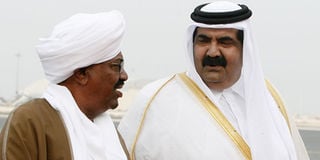Bashir in Qatar for Summit

Qatari Emir Sheikh Hamad bin Khalifa al-Thani (right) welcomes Sudanese President Omar Hassan al-Bashir upon his arrival at Doha international airport March 29, 2009. Bashir arrived in the Gulf state of Qatar on Sunday, Al Jazeera television reported, as Arab leaders gathered for a summit set to discuss his indictment for war crimes. Photo/REUTERS
DOHA, Sunday
Sudanese President Omar Hassan al-Bashir arrived in the Gulf state of Qatar today, Al Jazeera television reported, as Arab leaders gathered for a summit set to discuss his indictment for war crimes.
President Bashir has visited Egypt, Eritrea, Libya and Ethiopia in the weeks since the International Criminal Court (ICC) issued a warrant for his arrest and accused him of masterminding war crimes and crimes against humanity in Darfur.
Qatar, which hosts a key US military base, said last week it had faced unspecified pressure not to receive Bashir but it repeated an invitation for him to attend.
Libyan leader Muammar Gaddafi today described the indictment of President Bashir as “First World terrorism”.
War crimes
“The ICC warrant to arrest President Bashir is an attempt by (the West) to recolonise their former colonies,” President Gaddafi, the current chairman of the African Union (AU), told reporters in the Ethiopian capital Addia Ababa.
“It is a practice of a First World terrorism. It is not fair that a sitting head of state should be arrested. That is why all Third World countries are opposing ICC’s warrant against President Bashir,” Col Gaddafi added.
The ICC issued an arrest warrant for President Bashir on March 4 on seven counts of war crimes and crimes against humanity in the Darfur region of western Sudan, where international experts say more than 200,000 people have been killed since 2003.
Qatar is not one of the 108 states which are parties to the Rome statute which set up the International Criminal Court.
Even where a state is a party to the statute, the Hague-based court has no means of enforcing its warrants.
The African Union says that the warrant is likely to compromise attempts to make peace in Darfur and the 53-member organisation wants the indictment deferred.
Col Gaddafi said last month that “foreign forces” including Israel were behind the Darfur conflict and urged the court to stop proceedings against President Bashir.
The veteran Libyan leader says Africa can solve its own problems and has made a number of attempts to broker peace between Darfur rebels and the Khartoum government.
Might withdraw
Veteran Libyan diplomat Ali Triki told reporters in Addis Ababa on Saturday that the African members of the ICC might withdraw in protest over the warrant.
“The ICC decision is a major issue for Africa. We have said time and again that we did not accept the ICC’s decision against President Bashir,” said Triki, Libya’s African affairs minister.
“The 33 African member states of the ICC will meet in the immediate future to consider withdrawing from ICC,” he said.
The Arab summit will seek to give backing to Sudan over the international arrest warrant for its president and ease a deep rift among Arab states over how to deal with ascendant Shi’ite power Iran.
Arab governments have struggled to respond to Iran’s political clout since the US invasion of Iraq in 2003, bringing long oppressed Shi’ite Muslims there to power.
The leaders of Egypt and Saudi Arabia see Iran’s hand behind the strength of Hezbollah in Lebanon and Hamas in the Palestinian territories -- Islamist groups who refuse to renounce armed action in the historic Arab conflict with Israel.
Other Arab countries with good ties to Iran, such as Syria and Qatar, back the populist view in the Arab world that the policies of Hezbollah and Hamas are legitimate responses to Israel, which rejects returning Arab lands it seized in 1967.
Israel’s recent war on Gaza exposed the divisions, with Qatar hosting a crisis summit that brought together Arab leaders plus Iranian President Mahmoud Ahmadinejad and leading figures from Hamas. The meeting threatened to revoke an Arab peace proposal to Israel, championed by Washington’s Arab allies.
Regional heavyweights
Egypt and Saudi Arabia refused to attend, saying an economic summit of Arab leaders that had already been planned before the Gaza war would suffice. Egypt is the Arab world’s most populous country and Saudi Arabia is the world’s biggest exporter of oil and the birthplace of Islam, making them regional heavyweights.
“The Doha summit is still a battleground between the emerging de facto alliance between Qatar, Syria and Iran, on one side, and the Saudis, Egyptians and Jordanians, on the other,” said Ali al-Ahmed, a US-based Saudi opposition figure. It was not clear if any Iranian officials would attend as observers.
Plans by Qatar and Arab League chief Amr Moussa to make the meeting a reconciliation summit were spoiled by Egyptian President Hosni Mubarak’s surprise decision not to attend -- apparently over continuing rancour at the Gaza summit chaos.
The Egyptian and Saudi leaders pulled out of last year’s summit in Damascus in protest at Syria’s backing for Hezbollah in Lebanon, which they believe was done at Iran’s bidding. (Reuters)




